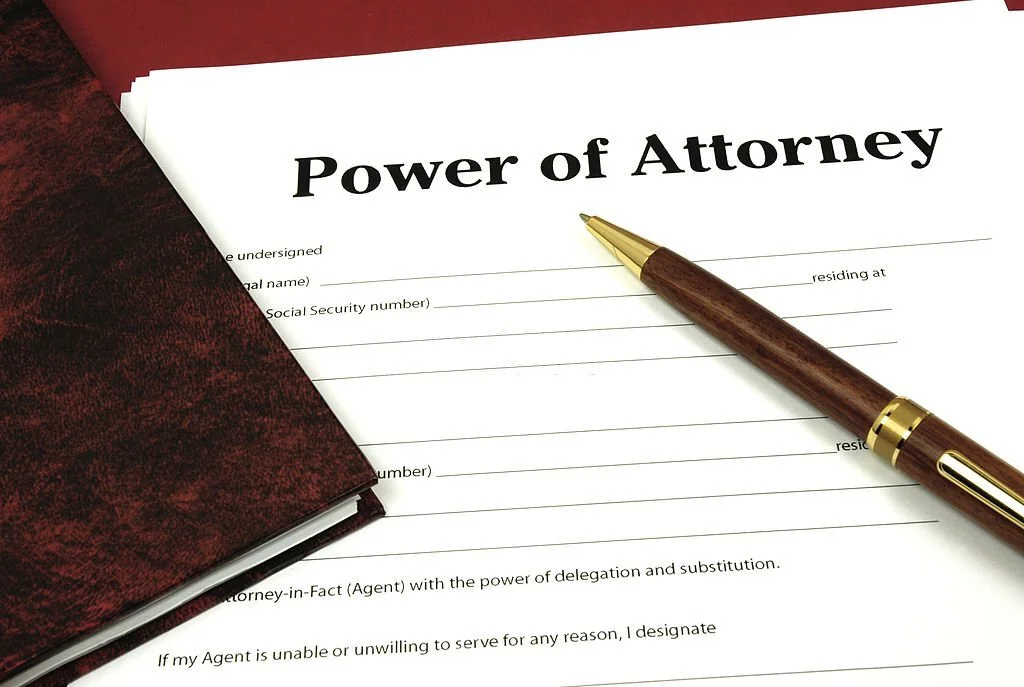How to Draft a Power of Attorney: A Step-by-Step Guide
Ty McDuffey
April 26, 2024
|


The intelligent digital vault for families
Trustworthy protects and optimizes important family information so you can save time, money, and enjoy peace of mind
Whether you need a power of attorney (POA) for financial matters, healthcare decisions, or other personal affairs, it's important to draft it correctly. This ensures your wishes are carried out and your interests are protected.
We’ll explain how to write a power of attorney and show you the important steps to take during the process.
Key Takeaways:
First, determine the type of power of attorney based on your specific circumstances and requirements.
Choose a trusted and reliable person to serve as your agent or attorney-in-fact.
Be specific about the powers you want to grant and any limitations or restrictions you want to impose.
Step 1: Determine the Type of Power of Attorney You Need

The first step in writing a power of attorney is determining the type of POA that best suits your needs.
General Power of Attorney
A general power of attorney (POA) is a legal document granting powers to your chosen agent or attorney-in-fact to act on your behalf in financial and legal matters. This type of POA is often used temporarily, such as when traveling, physically or mentally unable to handle your affairs, or simply needing assistance with day-to-day tasks.
When you create a general POA, you give your agent the authority to make decisions and take actions in your name, such as:
Managing your bank accounts and financial transactions
Paying your bills and handling your taxes
Buying, selling, or managing your real estate properties
Handling your insurance matters and legal affairs
Accessing your safe deposit boxes and other secure storage
Making gifts or donations on your behalf (if specifically authorized)
A general POA is typically valid for a specific period or until you revoke it.
Durable Power of Attorney
A durable power of attorney remains in effect even if you become incapacitated or unable to make decisions for yourself. It continues to be valid and allows your agent to manage your affairs on your behalf.
There are two main types of durable POAs:
Immediate Durable Power of Attorney: It takes effect once you sign it and remains valid even if you become incapacitated later. Your agent can begin acting on your behalf immediately, without additional documentation or court intervention.
Springing Durable Power of Attorney: It "springs" into effect only when a specific event occurs, such as when you become incapacitated. Until that event occurs, your agent does not have the authority to act on your behalf.
Durable POAs are commonly used for long-term financial management and healthcare decision-making.
Healthcare Power of Attorney
A healthcare power of attorney (also known as a medical power of attorney) is a legal document granting your chosen agent the authority to make medical decisions on your behalf if you cannot do so yourself. This type of POA is often used with a living will, which outlines your specific wishes for end-of-life care.
When you create a healthcare POA, you give your agent the power to:
Make decisions about your medical treatment, including consenting to or refusing procedures, medications, and surgeries
Access your medical records and communicate with your healthcare providers
Decide on your living arrangements, such as admitting you to a hospital, nursing home, or hospice care
Enforce your wishes regarding life-sustaining treatments, as outlined in your living will
A healthcare POA ensures that your medical wishes are respected if you become incapacitated due to illness, injury, or age-related cognitive decline.
Limited or Special Power of Attorney
A limited or special power of attorney grants specific powers to your agent for a particular purpose or transaction. Unlike a general POA, which gives your agent broad authority, a limited or special POA restricts their powers to a specific task or set of tasks.
Some common examples of limited or special POAs include:
Real Estate Power of Attorney
Vehicle Power of Attorney
Investment Power of Attorney
Business Power of Attorney
By tailoring the POA to your specific needs, you can maintain control over your affairs while still getting the required assistance.
Step 2: Choose Your Agent

Choosing the right person to serve as your agent or attorney-in-fact is paramount. This person will have significant authority over your affairs, so selecting the right person is essential.
When choosing an agent, consider the following factors:
Trustworthiness: Choose someone you trust completely to follow your wishes and act in your best interests, even in difficult or stressful situations.
Clinton M. Sandvick, JD, Ph.D., advises:
"The agent should also have the necessary background and understand the situation they will be put in when the power of attorney goes into effect. Consider the age, health, and location of potential agents."Reliability: Select an agent who is responsible, organized, and capable of handling the role's duties and responsibilities.
Proximity: Consider choosing an agent who lives nearby or is easily accessible, especially if they need to make decisions or take action on short notice.
Willingness: Ensure your chosen agent is willing and able to serve in this role and understands the responsibilities involved.
It's also a good idea to name a successor agent in case your primary agent is unable or unwilling to serve when needed.
Step 3: Specify the Powers You Want to Grant

Be specific about the powers you want to grant to your agent. Clearly define the scope of their authority and any limitations or restrictions you want to impose.
Some common powers granted in a POA include:
Financial Powers
When granting financial powers to your agent through a power of attorney, you enable them to manage your financial affairs on your behalf. This can include a wide range of tasks, such as:
Accessing and managing your bank accounts, including checking, savings, and investment accounts
Writing checks and making deposits or withdrawals on your behalf
Paying your bills, such as utilities, credit cards, and mortgage or rent payments
By granting financial powers to your agent, you entrust them with responsibility for your financial well-being. Choose someone you trust to make sound decisions and act in your best interests.
Real Estate Powers
Real estate powers allow your agent to make decisions related to your real estate properties. This can include:
Buying or selling real estate on your behalf, including negotiating prices, signing contracts, and handling closing procedures
Refinancing or obtaining mortgages for your properties
Managing your rental properties, including finding tenants, collecting rent, and handling maintenance and repairs
By granting real estate powers to your agent, you're allowing them to make important decisions about your properties. Choose someone with the necessary knowledge and experience to handle these matters effectively.
Legal Powers
Legal powers authorize your agent to make legal decisions and act on your behalf. This can include:
Entering into contracts or agreements in your name, such as leases, service contracts, or business agreements
Hiring and communicating with attorneys to represent your interests in legal matters
Making decisions related to legal proceedings, such as settling claims or lawsuits, or filing appeals
Legal powers can significantly affect your rights and obligations, so choose an agent capable of making sound legal decisions in your best interests.
Healthcare Powers
Healthcare powers give your agent the authority to make medical decisions and take actions related to your healthcare when you cannot do so yourself. This can include:
Making decisions about your medical treatment, such as consenting to or refusing surgeries, medications, or other procedures
Accessing your medical records and communicating with your healthcare providers about your condition and treatment options
Enforcing your wishes regarding life-sustaining treatments, as outlined in your living will or advance directive
It's important to choose an agent who understands your values and preferences and is willing to advocate for your best interests in medical situations.
Creating a power of attorney is a key step in protecting your interests and ensuring your affairs are managed according to your wishes. By using Trustworthy to store and share your POA securely, you can have confidence that your legal and financial matters will be handled properly, even if you become unable to manage them yourself.
Step 4: Ensure Compliance with State Laws

Each state has legal requirements for creating a valid power of attorney. Ensure your POA complies with your state's laws and is properly executed and notarized.
Some common requirements for a valid power of attorney include:
Written Document
Most states require a power of attorney in writing and signed by the principal (the person granting the powers) for it to be legally valid. This helps to ensure the principal's wishes are clearly documented and can be easily verified if needed.
When creating a written power of attorney, include the following information:
The name and contact information of the principal
The name and contact information of the agent or attorney-in-fact
The specific powers being granted to the agent
The duration of the power of attorney (e.g., whether it is durable or expires on a specific date)
The principal's signature and the date of signing
Once you create your power of attorney, you need to store the document securely and ensure your agent and other trusted parties can access it when needed. Trustworthy provides a secure online platform for storing and sharing your power of attorney and other important legal documents.
Notarization
Notarization aims to prevent fraud and ensure the principal is signing the power of attorney voluntarily and with a clear understanding of its contents. Notaries are trained to look for signs of coercion, duress, or lack of capacity.
To have a power of attorney notarized, the principal must typically appear in person before a notary public and provide valid government-issued photo identification. The notary will then verify the principal's identity, witness the signing of the document, and affix their official seal and signature to the power of attorney.
Notarization requirements vary by state, so it's wise to research your state's specific requirements or work with an attorney to ensure your power of attorney is properly notarized.
Witnesses
Some states require a power of attorney to be signed in the presence of one or more witnesses, who must also sign the document. Witness requirements can vary by state, but generally, a witness must be:
At least 18 years old
Not named as an agent or attorney-in-fact in the power of attorney
Not related to the principal by blood, marriage, or adoption
Not a caregiver or healthcare provider for the principal
When signing as a witness, the individual is attesting that they saw the principal sign the power of attorney and that the principal appeared to be of sound mind and under no duress or undue influence.
Specific Language
Certain states require specific language or provisions to be included in a power of attorney for it to be legally enforceable. This language may relate to the powers being granted, the duration of the document, or the principal's right to revoke the power of attorney.
For example, some states may require a power of attorney to include specific language indicating it’s a "durable" power of attorney that remains in effect even if the principal becomes incapacitated. Other states require language specifying that the agent has the authority to make gifts on behalf of the principal.
If you're unsure about the specific language requirements in your state, it's always best to consult with an attorney.
Step 5: Review and Update Your Power of Attorney Regularly

Once you've created your power of attorney, reviewing and updating the document regularly is essential to ensure it reflects your current wishes and circumstances. Some events that may trigger a review of your POA include:
Changes in your health or cognitive abilities
Changes in your financial or personal circumstances
Changes in your relationship with your chosen agent
Changes in your state's laws or regulations governing powers of attorney
By keeping your power of attorney up to date, you can ensure that your affairs will be managed according to your current preferences and that your agent will have the necessary authority to act on your behalf.
It's important to note that a power of attorney is only valid during your lifetime. If you pass away, your agent's authority ends, and your estate will be managed according to the terms of your will or trust.
FAQs
Can I have multiple agents in my power of attorney?
Yes, you can name multiple agents in your power of attorney. This can be useful if you want to divide responsibilities among different people or ensure there’s a backup agent. However, be sure to specify whether the agents can act independently or must make decisions jointly.
Can I revoke or change my power of attorney?
Yes, you can revoke or change your power of attorney at any time as long as you are mentally competent. To revoke a power of attorney, you should notify your agent in writing and destroy all copies of the document. To change your power of attorney, you will need to create a new document that reflects your current wishes and revokes the previous POA.
What happens if my agent abuses their powers or acts against my wishes?
If your agent misuses their authority or fails to act in your best interests, you can revoke the power of attorney and take legal action against them if necessary. This is why it's important to choose a trustworthy and reliable agent who will follow your instructions and act in good faith.
How to Draft a Power of Attorney: A Step-by-Step Guide
Ty McDuffey
April 26, 2024
|

Whether you need a power of attorney (POA) for financial matters, healthcare decisions, or other personal affairs, it's important to draft it correctly. This ensures your wishes are carried out and your interests are protected.
We’ll explain how to write a power of attorney and show you the important steps to take during the process.
Key Takeaways:
First, determine the type of power of attorney based on your specific circumstances and requirements.
Choose a trusted and reliable person to serve as your agent or attorney-in-fact.
Be specific about the powers you want to grant and any limitations or restrictions you want to impose.
Step 1: Determine the Type of Power of Attorney You Need

The first step in writing a power of attorney is determining the type of POA that best suits your needs.
General Power of Attorney
A general power of attorney (POA) is a legal document granting powers to your chosen agent or attorney-in-fact to act on your behalf in financial and legal matters. This type of POA is often used temporarily, such as when traveling, physically or mentally unable to handle your affairs, or simply needing assistance with day-to-day tasks.
When you create a general POA, you give your agent the authority to make decisions and take actions in your name, such as:
Managing your bank accounts and financial transactions
Paying your bills and handling your taxes
Buying, selling, or managing your real estate properties
Handling your insurance matters and legal affairs
Accessing your safe deposit boxes and other secure storage
Making gifts or donations on your behalf (if specifically authorized)
A general POA is typically valid for a specific period or until you revoke it.
Durable Power of Attorney
A durable power of attorney remains in effect even if you become incapacitated or unable to make decisions for yourself. It continues to be valid and allows your agent to manage your affairs on your behalf.
There are two main types of durable POAs:
Immediate Durable Power of Attorney: It takes effect once you sign it and remains valid even if you become incapacitated later. Your agent can begin acting on your behalf immediately, without additional documentation or court intervention.
Springing Durable Power of Attorney: It "springs" into effect only when a specific event occurs, such as when you become incapacitated. Until that event occurs, your agent does not have the authority to act on your behalf.
Durable POAs are commonly used for long-term financial management and healthcare decision-making.
Healthcare Power of Attorney
A healthcare power of attorney (also known as a medical power of attorney) is a legal document granting your chosen agent the authority to make medical decisions on your behalf if you cannot do so yourself. This type of POA is often used with a living will, which outlines your specific wishes for end-of-life care.
When you create a healthcare POA, you give your agent the power to:
Make decisions about your medical treatment, including consenting to or refusing procedures, medications, and surgeries
Access your medical records and communicate with your healthcare providers
Decide on your living arrangements, such as admitting you to a hospital, nursing home, or hospice care
Enforce your wishes regarding life-sustaining treatments, as outlined in your living will
A healthcare POA ensures that your medical wishes are respected if you become incapacitated due to illness, injury, or age-related cognitive decline.
Limited or Special Power of Attorney
A limited or special power of attorney grants specific powers to your agent for a particular purpose or transaction. Unlike a general POA, which gives your agent broad authority, a limited or special POA restricts their powers to a specific task or set of tasks.
Some common examples of limited or special POAs include:
Real Estate Power of Attorney
Vehicle Power of Attorney
Investment Power of Attorney
Business Power of Attorney
By tailoring the POA to your specific needs, you can maintain control over your affairs while still getting the required assistance.
Step 2: Choose Your Agent

Choosing the right person to serve as your agent or attorney-in-fact is paramount. This person will have significant authority over your affairs, so selecting the right person is essential.
When choosing an agent, consider the following factors:
Trustworthiness: Choose someone you trust completely to follow your wishes and act in your best interests, even in difficult or stressful situations.
Clinton M. Sandvick, JD, Ph.D., advises:
"The agent should also have the necessary background and understand the situation they will be put in when the power of attorney goes into effect. Consider the age, health, and location of potential agents."Reliability: Select an agent who is responsible, organized, and capable of handling the role's duties and responsibilities.
Proximity: Consider choosing an agent who lives nearby or is easily accessible, especially if they need to make decisions or take action on short notice.
Willingness: Ensure your chosen agent is willing and able to serve in this role and understands the responsibilities involved.
It's also a good idea to name a successor agent in case your primary agent is unable or unwilling to serve when needed.
Step 3: Specify the Powers You Want to Grant

Be specific about the powers you want to grant to your agent. Clearly define the scope of their authority and any limitations or restrictions you want to impose.
Some common powers granted in a POA include:
Financial Powers
When granting financial powers to your agent through a power of attorney, you enable them to manage your financial affairs on your behalf. This can include a wide range of tasks, such as:
Accessing and managing your bank accounts, including checking, savings, and investment accounts
Writing checks and making deposits or withdrawals on your behalf
Paying your bills, such as utilities, credit cards, and mortgage or rent payments
By granting financial powers to your agent, you entrust them with responsibility for your financial well-being. Choose someone you trust to make sound decisions and act in your best interests.
Real Estate Powers
Real estate powers allow your agent to make decisions related to your real estate properties. This can include:
Buying or selling real estate on your behalf, including negotiating prices, signing contracts, and handling closing procedures
Refinancing or obtaining mortgages for your properties
Managing your rental properties, including finding tenants, collecting rent, and handling maintenance and repairs
By granting real estate powers to your agent, you're allowing them to make important decisions about your properties. Choose someone with the necessary knowledge and experience to handle these matters effectively.
Legal Powers
Legal powers authorize your agent to make legal decisions and act on your behalf. This can include:
Entering into contracts or agreements in your name, such as leases, service contracts, or business agreements
Hiring and communicating with attorneys to represent your interests in legal matters
Making decisions related to legal proceedings, such as settling claims or lawsuits, or filing appeals
Legal powers can significantly affect your rights and obligations, so choose an agent capable of making sound legal decisions in your best interests.
Healthcare Powers
Healthcare powers give your agent the authority to make medical decisions and take actions related to your healthcare when you cannot do so yourself. This can include:
Making decisions about your medical treatment, such as consenting to or refusing surgeries, medications, or other procedures
Accessing your medical records and communicating with your healthcare providers about your condition and treatment options
Enforcing your wishes regarding life-sustaining treatments, as outlined in your living will or advance directive
It's important to choose an agent who understands your values and preferences and is willing to advocate for your best interests in medical situations.
Creating a power of attorney is a key step in protecting your interests and ensuring your affairs are managed according to your wishes. By using Trustworthy to store and share your POA securely, you can have confidence that your legal and financial matters will be handled properly, even if you become unable to manage them yourself.
Step 4: Ensure Compliance with State Laws

Each state has legal requirements for creating a valid power of attorney. Ensure your POA complies with your state's laws and is properly executed and notarized.
Some common requirements for a valid power of attorney include:
Written Document
Most states require a power of attorney in writing and signed by the principal (the person granting the powers) for it to be legally valid. This helps to ensure the principal's wishes are clearly documented and can be easily verified if needed.
When creating a written power of attorney, include the following information:
The name and contact information of the principal
The name and contact information of the agent or attorney-in-fact
The specific powers being granted to the agent
The duration of the power of attorney (e.g., whether it is durable or expires on a specific date)
The principal's signature and the date of signing
Once you create your power of attorney, you need to store the document securely and ensure your agent and other trusted parties can access it when needed. Trustworthy provides a secure online platform for storing and sharing your power of attorney and other important legal documents.
Notarization
Notarization aims to prevent fraud and ensure the principal is signing the power of attorney voluntarily and with a clear understanding of its contents. Notaries are trained to look for signs of coercion, duress, or lack of capacity.
To have a power of attorney notarized, the principal must typically appear in person before a notary public and provide valid government-issued photo identification. The notary will then verify the principal's identity, witness the signing of the document, and affix their official seal and signature to the power of attorney.
Notarization requirements vary by state, so it's wise to research your state's specific requirements or work with an attorney to ensure your power of attorney is properly notarized.
Witnesses
Some states require a power of attorney to be signed in the presence of one or more witnesses, who must also sign the document. Witness requirements can vary by state, but generally, a witness must be:
At least 18 years old
Not named as an agent or attorney-in-fact in the power of attorney
Not related to the principal by blood, marriage, or adoption
Not a caregiver or healthcare provider for the principal
When signing as a witness, the individual is attesting that they saw the principal sign the power of attorney and that the principal appeared to be of sound mind and under no duress or undue influence.
Specific Language
Certain states require specific language or provisions to be included in a power of attorney for it to be legally enforceable. This language may relate to the powers being granted, the duration of the document, or the principal's right to revoke the power of attorney.
For example, some states may require a power of attorney to include specific language indicating it’s a "durable" power of attorney that remains in effect even if the principal becomes incapacitated. Other states require language specifying that the agent has the authority to make gifts on behalf of the principal.
If you're unsure about the specific language requirements in your state, it's always best to consult with an attorney.
Step 5: Review and Update Your Power of Attorney Regularly

Once you've created your power of attorney, reviewing and updating the document regularly is essential to ensure it reflects your current wishes and circumstances. Some events that may trigger a review of your POA include:
Changes in your health or cognitive abilities
Changes in your financial or personal circumstances
Changes in your relationship with your chosen agent
Changes in your state's laws or regulations governing powers of attorney
By keeping your power of attorney up to date, you can ensure that your affairs will be managed according to your current preferences and that your agent will have the necessary authority to act on your behalf.
It's important to note that a power of attorney is only valid during your lifetime. If you pass away, your agent's authority ends, and your estate will be managed according to the terms of your will or trust.
FAQs
Can I have multiple agents in my power of attorney?
Yes, you can name multiple agents in your power of attorney. This can be useful if you want to divide responsibilities among different people or ensure there’s a backup agent. However, be sure to specify whether the agents can act independently or must make decisions jointly.
Can I revoke or change my power of attorney?
Yes, you can revoke or change your power of attorney at any time as long as you are mentally competent. To revoke a power of attorney, you should notify your agent in writing and destroy all copies of the document. To change your power of attorney, you will need to create a new document that reflects your current wishes and revokes the previous POA.
What happens if my agent abuses their powers or acts against my wishes?
If your agent misuses their authority or fails to act in your best interests, you can revoke the power of attorney and take legal action against them if necessary. This is why it's important to choose a trustworthy and reliable agent who will follow your instructions and act in good faith.
How to Draft a Power of Attorney: A Step-by-Step Guide
Ty McDuffey
April 26, 2024
|


The intelligent digital vault for families
Trustworthy protects and optimizes important family information so you can save time, money, and enjoy peace of mind
Whether you need a power of attorney (POA) for financial matters, healthcare decisions, or other personal affairs, it's important to draft it correctly. This ensures your wishes are carried out and your interests are protected.
We’ll explain how to write a power of attorney and show you the important steps to take during the process.
Key Takeaways:
First, determine the type of power of attorney based on your specific circumstances and requirements.
Choose a trusted and reliable person to serve as your agent or attorney-in-fact.
Be specific about the powers you want to grant and any limitations or restrictions you want to impose.
Step 1: Determine the Type of Power of Attorney You Need

The first step in writing a power of attorney is determining the type of POA that best suits your needs.
General Power of Attorney
A general power of attorney (POA) is a legal document granting powers to your chosen agent or attorney-in-fact to act on your behalf in financial and legal matters. This type of POA is often used temporarily, such as when traveling, physically or mentally unable to handle your affairs, or simply needing assistance with day-to-day tasks.
When you create a general POA, you give your agent the authority to make decisions and take actions in your name, such as:
Managing your bank accounts and financial transactions
Paying your bills and handling your taxes
Buying, selling, or managing your real estate properties
Handling your insurance matters and legal affairs
Accessing your safe deposit boxes and other secure storage
Making gifts or donations on your behalf (if specifically authorized)
A general POA is typically valid for a specific period or until you revoke it.
Durable Power of Attorney
A durable power of attorney remains in effect even if you become incapacitated or unable to make decisions for yourself. It continues to be valid and allows your agent to manage your affairs on your behalf.
There are two main types of durable POAs:
Immediate Durable Power of Attorney: It takes effect once you sign it and remains valid even if you become incapacitated later. Your agent can begin acting on your behalf immediately, without additional documentation or court intervention.
Springing Durable Power of Attorney: It "springs" into effect only when a specific event occurs, such as when you become incapacitated. Until that event occurs, your agent does not have the authority to act on your behalf.
Durable POAs are commonly used for long-term financial management and healthcare decision-making.
Healthcare Power of Attorney
A healthcare power of attorney (also known as a medical power of attorney) is a legal document granting your chosen agent the authority to make medical decisions on your behalf if you cannot do so yourself. This type of POA is often used with a living will, which outlines your specific wishes for end-of-life care.
When you create a healthcare POA, you give your agent the power to:
Make decisions about your medical treatment, including consenting to or refusing procedures, medications, and surgeries
Access your medical records and communicate with your healthcare providers
Decide on your living arrangements, such as admitting you to a hospital, nursing home, or hospice care
Enforce your wishes regarding life-sustaining treatments, as outlined in your living will
A healthcare POA ensures that your medical wishes are respected if you become incapacitated due to illness, injury, or age-related cognitive decline.
Limited or Special Power of Attorney
A limited or special power of attorney grants specific powers to your agent for a particular purpose or transaction. Unlike a general POA, which gives your agent broad authority, a limited or special POA restricts their powers to a specific task or set of tasks.
Some common examples of limited or special POAs include:
Real Estate Power of Attorney
Vehicle Power of Attorney
Investment Power of Attorney
Business Power of Attorney
By tailoring the POA to your specific needs, you can maintain control over your affairs while still getting the required assistance.
Step 2: Choose Your Agent

Choosing the right person to serve as your agent or attorney-in-fact is paramount. This person will have significant authority over your affairs, so selecting the right person is essential.
When choosing an agent, consider the following factors:
Trustworthiness: Choose someone you trust completely to follow your wishes and act in your best interests, even in difficult or stressful situations.
Clinton M. Sandvick, JD, Ph.D., advises:
"The agent should also have the necessary background and understand the situation they will be put in when the power of attorney goes into effect. Consider the age, health, and location of potential agents."Reliability: Select an agent who is responsible, organized, and capable of handling the role's duties and responsibilities.
Proximity: Consider choosing an agent who lives nearby or is easily accessible, especially if they need to make decisions or take action on short notice.
Willingness: Ensure your chosen agent is willing and able to serve in this role and understands the responsibilities involved.
It's also a good idea to name a successor agent in case your primary agent is unable or unwilling to serve when needed.
Step 3: Specify the Powers You Want to Grant

Be specific about the powers you want to grant to your agent. Clearly define the scope of their authority and any limitations or restrictions you want to impose.
Some common powers granted in a POA include:
Financial Powers
When granting financial powers to your agent through a power of attorney, you enable them to manage your financial affairs on your behalf. This can include a wide range of tasks, such as:
Accessing and managing your bank accounts, including checking, savings, and investment accounts
Writing checks and making deposits or withdrawals on your behalf
Paying your bills, such as utilities, credit cards, and mortgage or rent payments
By granting financial powers to your agent, you entrust them with responsibility for your financial well-being. Choose someone you trust to make sound decisions and act in your best interests.
Real Estate Powers
Real estate powers allow your agent to make decisions related to your real estate properties. This can include:
Buying or selling real estate on your behalf, including negotiating prices, signing contracts, and handling closing procedures
Refinancing or obtaining mortgages for your properties
Managing your rental properties, including finding tenants, collecting rent, and handling maintenance and repairs
By granting real estate powers to your agent, you're allowing them to make important decisions about your properties. Choose someone with the necessary knowledge and experience to handle these matters effectively.
Legal Powers
Legal powers authorize your agent to make legal decisions and act on your behalf. This can include:
Entering into contracts or agreements in your name, such as leases, service contracts, or business agreements
Hiring and communicating with attorneys to represent your interests in legal matters
Making decisions related to legal proceedings, such as settling claims or lawsuits, or filing appeals
Legal powers can significantly affect your rights and obligations, so choose an agent capable of making sound legal decisions in your best interests.
Healthcare Powers
Healthcare powers give your agent the authority to make medical decisions and take actions related to your healthcare when you cannot do so yourself. This can include:
Making decisions about your medical treatment, such as consenting to or refusing surgeries, medications, or other procedures
Accessing your medical records and communicating with your healthcare providers about your condition and treatment options
Enforcing your wishes regarding life-sustaining treatments, as outlined in your living will or advance directive
It's important to choose an agent who understands your values and preferences and is willing to advocate for your best interests in medical situations.
Creating a power of attorney is a key step in protecting your interests and ensuring your affairs are managed according to your wishes. By using Trustworthy to store and share your POA securely, you can have confidence that your legal and financial matters will be handled properly, even if you become unable to manage them yourself.
Step 4: Ensure Compliance with State Laws

Each state has legal requirements for creating a valid power of attorney. Ensure your POA complies with your state's laws and is properly executed and notarized.
Some common requirements for a valid power of attorney include:
Written Document
Most states require a power of attorney in writing and signed by the principal (the person granting the powers) for it to be legally valid. This helps to ensure the principal's wishes are clearly documented and can be easily verified if needed.
When creating a written power of attorney, include the following information:
The name and contact information of the principal
The name and contact information of the agent or attorney-in-fact
The specific powers being granted to the agent
The duration of the power of attorney (e.g., whether it is durable or expires on a specific date)
The principal's signature and the date of signing
Once you create your power of attorney, you need to store the document securely and ensure your agent and other trusted parties can access it when needed. Trustworthy provides a secure online platform for storing and sharing your power of attorney and other important legal documents.
Notarization
Notarization aims to prevent fraud and ensure the principal is signing the power of attorney voluntarily and with a clear understanding of its contents. Notaries are trained to look for signs of coercion, duress, or lack of capacity.
To have a power of attorney notarized, the principal must typically appear in person before a notary public and provide valid government-issued photo identification. The notary will then verify the principal's identity, witness the signing of the document, and affix their official seal and signature to the power of attorney.
Notarization requirements vary by state, so it's wise to research your state's specific requirements or work with an attorney to ensure your power of attorney is properly notarized.
Witnesses
Some states require a power of attorney to be signed in the presence of one or more witnesses, who must also sign the document. Witness requirements can vary by state, but generally, a witness must be:
At least 18 years old
Not named as an agent or attorney-in-fact in the power of attorney
Not related to the principal by blood, marriage, or adoption
Not a caregiver or healthcare provider for the principal
When signing as a witness, the individual is attesting that they saw the principal sign the power of attorney and that the principal appeared to be of sound mind and under no duress or undue influence.
Specific Language
Certain states require specific language or provisions to be included in a power of attorney for it to be legally enforceable. This language may relate to the powers being granted, the duration of the document, or the principal's right to revoke the power of attorney.
For example, some states may require a power of attorney to include specific language indicating it’s a "durable" power of attorney that remains in effect even if the principal becomes incapacitated. Other states require language specifying that the agent has the authority to make gifts on behalf of the principal.
If you're unsure about the specific language requirements in your state, it's always best to consult with an attorney.
Step 5: Review and Update Your Power of Attorney Regularly

Once you've created your power of attorney, reviewing and updating the document regularly is essential to ensure it reflects your current wishes and circumstances. Some events that may trigger a review of your POA include:
Changes in your health or cognitive abilities
Changes in your financial or personal circumstances
Changes in your relationship with your chosen agent
Changes in your state's laws or regulations governing powers of attorney
By keeping your power of attorney up to date, you can ensure that your affairs will be managed according to your current preferences and that your agent will have the necessary authority to act on your behalf.
It's important to note that a power of attorney is only valid during your lifetime. If you pass away, your agent's authority ends, and your estate will be managed according to the terms of your will or trust.
FAQs
Can I have multiple agents in my power of attorney?
Yes, you can name multiple agents in your power of attorney. This can be useful if you want to divide responsibilities among different people or ensure there’s a backup agent. However, be sure to specify whether the agents can act independently or must make decisions jointly.
Can I revoke or change my power of attorney?
Yes, you can revoke or change your power of attorney at any time as long as you are mentally competent. To revoke a power of attorney, you should notify your agent in writing and destroy all copies of the document. To change your power of attorney, you will need to create a new document that reflects your current wishes and revokes the previous POA.
What happens if my agent abuses their powers or acts against my wishes?
If your agent misuses their authority or fails to act in your best interests, you can revoke the power of attorney and take legal action against them if necessary. This is why it's important to choose a trustworthy and reliable agent who will follow your instructions and act in good faith.
How to Draft a Power of Attorney: A Step-by-Step Guide
Ty McDuffey
April 26, 2024
|


The intelligent digital vault for families
Trustworthy protects and optimizes important family information so you can save time, money, and enjoy peace of mind
Whether you need a power of attorney (POA) for financial matters, healthcare decisions, or other personal affairs, it's important to draft it correctly. This ensures your wishes are carried out and your interests are protected.
We’ll explain how to write a power of attorney and show you the important steps to take during the process.
Key Takeaways:
First, determine the type of power of attorney based on your specific circumstances and requirements.
Choose a trusted and reliable person to serve as your agent or attorney-in-fact.
Be specific about the powers you want to grant and any limitations or restrictions you want to impose.
Step 1: Determine the Type of Power of Attorney You Need

The first step in writing a power of attorney is determining the type of POA that best suits your needs.
General Power of Attorney
A general power of attorney (POA) is a legal document granting powers to your chosen agent or attorney-in-fact to act on your behalf in financial and legal matters. This type of POA is often used temporarily, such as when traveling, physically or mentally unable to handle your affairs, or simply needing assistance with day-to-day tasks.
When you create a general POA, you give your agent the authority to make decisions and take actions in your name, such as:
Managing your bank accounts and financial transactions
Paying your bills and handling your taxes
Buying, selling, or managing your real estate properties
Handling your insurance matters and legal affairs
Accessing your safe deposit boxes and other secure storage
Making gifts or donations on your behalf (if specifically authorized)
A general POA is typically valid for a specific period or until you revoke it.
Durable Power of Attorney
A durable power of attorney remains in effect even if you become incapacitated or unable to make decisions for yourself. It continues to be valid and allows your agent to manage your affairs on your behalf.
There are two main types of durable POAs:
Immediate Durable Power of Attorney: It takes effect once you sign it and remains valid even if you become incapacitated later. Your agent can begin acting on your behalf immediately, without additional documentation or court intervention.
Springing Durable Power of Attorney: It "springs" into effect only when a specific event occurs, such as when you become incapacitated. Until that event occurs, your agent does not have the authority to act on your behalf.
Durable POAs are commonly used for long-term financial management and healthcare decision-making.
Healthcare Power of Attorney
A healthcare power of attorney (also known as a medical power of attorney) is a legal document granting your chosen agent the authority to make medical decisions on your behalf if you cannot do so yourself. This type of POA is often used with a living will, which outlines your specific wishes for end-of-life care.
When you create a healthcare POA, you give your agent the power to:
Make decisions about your medical treatment, including consenting to or refusing procedures, medications, and surgeries
Access your medical records and communicate with your healthcare providers
Decide on your living arrangements, such as admitting you to a hospital, nursing home, or hospice care
Enforce your wishes regarding life-sustaining treatments, as outlined in your living will
A healthcare POA ensures that your medical wishes are respected if you become incapacitated due to illness, injury, or age-related cognitive decline.
Limited or Special Power of Attorney
A limited or special power of attorney grants specific powers to your agent for a particular purpose or transaction. Unlike a general POA, which gives your agent broad authority, a limited or special POA restricts their powers to a specific task or set of tasks.
Some common examples of limited or special POAs include:
Real Estate Power of Attorney
Vehicle Power of Attorney
Investment Power of Attorney
Business Power of Attorney
By tailoring the POA to your specific needs, you can maintain control over your affairs while still getting the required assistance.
Step 2: Choose Your Agent

Choosing the right person to serve as your agent or attorney-in-fact is paramount. This person will have significant authority over your affairs, so selecting the right person is essential.
When choosing an agent, consider the following factors:
Trustworthiness: Choose someone you trust completely to follow your wishes and act in your best interests, even in difficult or stressful situations.
Clinton M. Sandvick, JD, Ph.D., advises:
"The agent should also have the necessary background and understand the situation they will be put in when the power of attorney goes into effect. Consider the age, health, and location of potential agents."Reliability: Select an agent who is responsible, organized, and capable of handling the role's duties and responsibilities.
Proximity: Consider choosing an agent who lives nearby or is easily accessible, especially if they need to make decisions or take action on short notice.
Willingness: Ensure your chosen agent is willing and able to serve in this role and understands the responsibilities involved.
It's also a good idea to name a successor agent in case your primary agent is unable or unwilling to serve when needed.
Step 3: Specify the Powers You Want to Grant

Be specific about the powers you want to grant to your agent. Clearly define the scope of their authority and any limitations or restrictions you want to impose.
Some common powers granted in a POA include:
Financial Powers
When granting financial powers to your agent through a power of attorney, you enable them to manage your financial affairs on your behalf. This can include a wide range of tasks, such as:
Accessing and managing your bank accounts, including checking, savings, and investment accounts
Writing checks and making deposits or withdrawals on your behalf
Paying your bills, such as utilities, credit cards, and mortgage or rent payments
By granting financial powers to your agent, you entrust them with responsibility for your financial well-being. Choose someone you trust to make sound decisions and act in your best interests.
Real Estate Powers
Real estate powers allow your agent to make decisions related to your real estate properties. This can include:
Buying or selling real estate on your behalf, including negotiating prices, signing contracts, and handling closing procedures
Refinancing or obtaining mortgages for your properties
Managing your rental properties, including finding tenants, collecting rent, and handling maintenance and repairs
By granting real estate powers to your agent, you're allowing them to make important decisions about your properties. Choose someone with the necessary knowledge and experience to handle these matters effectively.
Legal Powers
Legal powers authorize your agent to make legal decisions and act on your behalf. This can include:
Entering into contracts or agreements in your name, such as leases, service contracts, or business agreements
Hiring and communicating with attorneys to represent your interests in legal matters
Making decisions related to legal proceedings, such as settling claims or lawsuits, or filing appeals
Legal powers can significantly affect your rights and obligations, so choose an agent capable of making sound legal decisions in your best interests.
Healthcare Powers
Healthcare powers give your agent the authority to make medical decisions and take actions related to your healthcare when you cannot do so yourself. This can include:
Making decisions about your medical treatment, such as consenting to or refusing surgeries, medications, or other procedures
Accessing your medical records and communicating with your healthcare providers about your condition and treatment options
Enforcing your wishes regarding life-sustaining treatments, as outlined in your living will or advance directive
It's important to choose an agent who understands your values and preferences and is willing to advocate for your best interests in medical situations.
Creating a power of attorney is a key step in protecting your interests and ensuring your affairs are managed according to your wishes. By using Trustworthy to store and share your POA securely, you can have confidence that your legal and financial matters will be handled properly, even if you become unable to manage them yourself.
Step 4: Ensure Compliance with State Laws

Each state has legal requirements for creating a valid power of attorney. Ensure your POA complies with your state's laws and is properly executed and notarized.
Some common requirements for a valid power of attorney include:
Written Document
Most states require a power of attorney in writing and signed by the principal (the person granting the powers) for it to be legally valid. This helps to ensure the principal's wishes are clearly documented and can be easily verified if needed.
When creating a written power of attorney, include the following information:
The name and contact information of the principal
The name and contact information of the agent or attorney-in-fact
The specific powers being granted to the agent
The duration of the power of attorney (e.g., whether it is durable or expires on a specific date)
The principal's signature and the date of signing
Once you create your power of attorney, you need to store the document securely and ensure your agent and other trusted parties can access it when needed. Trustworthy provides a secure online platform for storing and sharing your power of attorney and other important legal documents.
Notarization
Notarization aims to prevent fraud and ensure the principal is signing the power of attorney voluntarily and with a clear understanding of its contents. Notaries are trained to look for signs of coercion, duress, or lack of capacity.
To have a power of attorney notarized, the principal must typically appear in person before a notary public and provide valid government-issued photo identification. The notary will then verify the principal's identity, witness the signing of the document, and affix their official seal and signature to the power of attorney.
Notarization requirements vary by state, so it's wise to research your state's specific requirements or work with an attorney to ensure your power of attorney is properly notarized.
Witnesses
Some states require a power of attorney to be signed in the presence of one or more witnesses, who must also sign the document. Witness requirements can vary by state, but generally, a witness must be:
At least 18 years old
Not named as an agent or attorney-in-fact in the power of attorney
Not related to the principal by blood, marriage, or adoption
Not a caregiver or healthcare provider for the principal
When signing as a witness, the individual is attesting that they saw the principal sign the power of attorney and that the principal appeared to be of sound mind and under no duress or undue influence.
Specific Language
Certain states require specific language or provisions to be included in a power of attorney for it to be legally enforceable. This language may relate to the powers being granted, the duration of the document, or the principal's right to revoke the power of attorney.
For example, some states may require a power of attorney to include specific language indicating it’s a "durable" power of attorney that remains in effect even if the principal becomes incapacitated. Other states require language specifying that the agent has the authority to make gifts on behalf of the principal.
If you're unsure about the specific language requirements in your state, it's always best to consult with an attorney.
Step 5: Review and Update Your Power of Attorney Regularly

Once you've created your power of attorney, reviewing and updating the document regularly is essential to ensure it reflects your current wishes and circumstances. Some events that may trigger a review of your POA include:
Changes in your health or cognitive abilities
Changes in your financial or personal circumstances
Changes in your relationship with your chosen agent
Changes in your state's laws or regulations governing powers of attorney
By keeping your power of attorney up to date, you can ensure that your affairs will be managed according to your current preferences and that your agent will have the necessary authority to act on your behalf.
It's important to note that a power of attorney is only valid during your lifetime. If you pass away, your agent's authority ends, and your estate will be managed according to the terms of your will or trust.
FAQs
Can I have multiple agents in my power of attorney?
Yes, you can name multiple agents in your power of attorney. This can be useful if you want to divide responsibilities among different people or ensure there’s a backup agent. However, be sure to specify whether the agents can act independently or must make decisions jointly.
Can I revoke or change my power of attorney?
Yes, you can revoke or change your power of attorney at any time as long as you are mentally competent. To revoke a power of attorney, you should notify your agent in writing and destroy all copies of the document. To change your power of attorney, you will need to create a new document that reflects your current wishes and revokes the previous POA.
What happens if my agent abuses their powers or acts against my wishes?
If your agent misuses their authority or fails to act in your best interests, you can revoke the power of attorney and take legal action against them if necessary. This is why it's important to choose a trustworthy and reliable agent who will follow your instructions and act in good faith.
Try Trustworthy today.
Try Trustworthy today.
Try the Family Operating System® for yourself. You (and your family) will love it.
Try the Family Operating System® for yourself. You (and your family) will love it.
No credit card required.
No credit card required.




Related Articles




May 15, 2024
May 15, 2024
Power of Attorney vs. Will: Understanding the Legal Authority
Power of Attorney vs. Will: Understanding the Legal Authority




May 15, 2024
May 15, 2024
Executor Fees: What Percentage of an Estate Is Typical?
Executor Fees: What Percentage of an Estate Is Typical?




May 9, 2024
May 9, 2024
Power of Attorney Liability: Risks and Responsibilities
Power of Attorney Liability: Risks and Responsibilities




May 9, 2024
May 9, 2024
The Timeline for Obtaining Power of Attorney Explained
The Timeline for Obtaining Power of Attorney Explained




May 7, 2024
May 7, 2024
The Comprehensive Guide to Power of Attorney Responsibilities
The Comprehensive Guide to Power of Attorney Responsibilities




May 3, 2024
May 3, 2024
Deceased's Property: How Long Before It Must Change Names?
Deceased's Property: How Long Before It Must Change Names?




Apr 26, 2024
Apr 26, 2024
Durable Power of Attorney: What Powers Does It Grant?
Durable Power of Attorney: What Powers Does It Grant?




Apr 26, 2024
Apr 26, 2024
How to Draft a Power of Attorney: A Step-by-Step Guide
How to Draft a Power of Attorney: A Step-by-Step Guide




Apr 23, 2024
Apr 23, 2024
Executor's Death: The Next Steps for an Estate
Executor's Death: The Next Steps for an Estate




Apr 19, 2024
Apr 19, 2024
Removing a Deceased Spouse from a Deed: 5 Necessary Steps
Removing a Deceased Spouse from a Deed: 5 Necessary Steps




Apr 17, 2024
Apr 17, 2024
After Death: Can a Spouse Change the Deceased's Will?
After Death: Can a Spouse Change the Deceased's Will?




Apr 17, 2024
Apr 17, 2024
Divorced Spouse's Rights to Property After Death Explained
Divorced Spouse's Rights to Property After Death Explained




Apr 11, 2024
Apr 11, 2024
Navigating Dual Benefits: VA Disability and Social Security
Navigating Dual Benefits: VA Disability and Social Security




Apr 11, 2024
Apr 11, 2024
Veteran Benefit Eligibility: Understanding Denials and Exclusions
Veteran Benefit Eligibility: Understanding Denials and Exclusions




Apr 4, 2024
Apr 4, 2024
Eligibility for Veteran’s Spouse Benefits: What You Need to Know
Eligibility for Veteran’s Spouse Benefits: What You Need to Know




Apr 3, 2024
Apr 3, 2024
VA Disability Payments: Can They Be Discontinued?
VA Disability Payments: Can They Be Discontinued?




Mar 30, 2024
Mar 30, 2024
Veteran Death: Essential Actions and Checklist for Next of Kin
Veteran Death: Essential Actions and Checklist for Next of Kin




Mar 27, 2024
Mar 27, 2024
SLATs in Estate Planning: An Innovative Strategy Explained
SLATs in Estate Planning: An Innovative Strategy Explained




Mar 27, 2024
Mar 27, 2024
Maximize Your Estate Planning with Survivorship Life Insurance
Maximize Your Estate Planning with Survivorship Life Insurance




Mar 23, 2024
Mar 23, 2024
VA Benefits Timeline: When They Stop After Death
VA Benefits Timeline: When They Stop After Death




Mar 20, 2024
Mar 20, 2024
Is Estate Planning a Legitimate Business Expense: Unveiling The Truth
Is Estate Planning a Legitimate Business Expense: Unveiling The Truth




Mar 15, 2024
Mar 15, 2024
Does Right of Survivorship Trump a Will: Legal Insights
Does Right of Survivorship Trump a Will: Legal Insights




Mar 13, 2024
Mar 13, 2024
Palliative Care at Home: Understanding Insurance Coverage
Palliative Care at Home: Understanding Insurance Coverage




Mar 13, 2024
Mar 13, 2024
Navigating Insurance Coverage for Hospice Care A Complete Guide
Navigating Insurance Coverage for Hospice Care A Complete Guide




Mar 9, 2024
Mar 9, 2024
Choosing an Estate Planning Attorney: Traits of Excellence
Choosing an Estate Planning Attorney: Traits of Excellence




Mar 7, 2024
Mar 7, 2024
Can Family Overrule an Advance Directive? What You Need to Know
Can Family Overrule an Advance Directive? What You Need to Know




Mar 7, 2024
Mar 7, 2024
Funding Hospice Care in Nursing Homes: Who Bears the Cost?
Funding Hospice Care in Nursing Homes: Who Bears the Cost?




Mar 5, 2024
Mar 5, 2024
Who Can Legally Witness an Advance Directive? Know Your Rights
Who Can Legally Witness an Advance Directive? Know Your Rights




Mar 5, 2024
Mar 5, 2024
Exploring Hospice Care: What’s Not Included?
Exploring Hospice Care: What’s Not Included?




Mar 5, 2024
Mar 5, 2024
Respite Care in Hospice: Providing Relief for Caregivers
Respite Care in Hospice: Providing Relief for Caregivers




Mar 5, 2024
Mar 5, 2024
Exploring the Spectrum: Different Types of Advance Directives
Exploring the Spectrum: Different Types of Advance Directives




Feb 28, 2024
Feb 28, 2024
Deciding on Hospice Care: Knowing When It's Time
Deciding on Hospice Care: Knowing When It's Time




Feb 27, 2024
Feb 27, 2024
Hospice Care Duration: How Long Can It Last?
Hospice Care Duration: How Long Can It Last?




Feb 27, 2024
Feb 27, 2024
Hospice Care Timeline: Estimating How Long to Live
Hospice Care Timeline: Estimating How Long to Live




Feb 22, 2024
Feb 22, 2024
Doctor-Ordered Hospice Care: When and Why It Happens
Doctor-Ordered Hospice Care: When and Why It Happens




Feb 20, 2024
Feb 20, 2024
Funeral Planning Timeline: How Long Does it Really Take?
Funeral Planning Timeline: How Long Does it Really Take?




Feb 15, 2024
Feb 15, 2024
Writing a Heartfelt Obituary for Your Husband: Inspiring Examples
Writing a Heartfelt Obituary for Your Husband: Inspiring Examples




Feb 14, 2024
Feb 14, 2024
Planning Your Funeral: The Best Age To Start
Planning Your Funeral: The Best Age To Start




Feb 14, 2024
Feb 14, 2024
Crafting a Loving Obituary For Your Son: Meaningful Examples
Crafting a Loving Obituary For Your Son: Meaningful Examples




Jan 18, 2024
Jan 18, 2024
Improving Communication Between Caregivers and Doctors
Improving Communication Between Caregivers and Doctors




Nov 29, 2023
Nov 29, 2023
Can Anyone Get a Copy of a Death Certificate? Who Is Authorized?
Can Anyone Get a Copy of a Death Certificate? Who Is Authorized?




Nov 25, 2023
Nov 25, 2023
Original Death Certificate vs. Certified Copy: Key Differences And Why They Matter
Original Death Certificate vs. Certified Copy: Key Differences And Why They Matter




Nov 25, 2023
Nov 25, 2023
How Do You Handle Negative Aspects of the Deceased's Life in a Eulogy?
How Do You Handle Negative Aspects of the Deceased's Life in a Eulogy?




Nov 25, 2023
Nov 25, 2023
Can There Be More Then One Eulogy at a Funeral? Etiquette Explained
Can There Be More Then One Eulogy at a Funeral? Etiquette Explained




Nov 24, 2023
Nov 24, 2023
My Dad Died, Can I Get His Retirement Pension?
My Dad Died, Can I Get His Retirement Pension?




Nov 24, 2023
Nov 24, 2023
How Many Copies of a Death Certificate Should You Get?
How Many Copies of a Death Certificate Should You Get?




Nov 24, 2023
Nov 24, 2023
Can a Eulogy Be Funny? Yes, Here Are 10 Respectful but Funny Examples
Can a Eulogy Be Funny? Yes, Here Are 10 Respectful but Funny Examples




Nov 24, 2023
Nov 24, 2023
How Do You Receive Inheritance Money WITHOUT any issues?
How Do You Receive Inheritance Money WITHOUT any issues?




Nov 17, 2023
Nov 17, 2023
Who Gets The Tax Refund of A Deceased Person? An Accountant Answers
Who Gets The Tax Refund of A Deceased Person? An Accountant Answers




Nov 17, 2023
Nov 17, 2023
How To Start a Eulogy: 15 Heartfelt Examples
How To Start a Eulogy: 15 Heartfelt Examples




Nov 14, 2023
Nov 14, 2023
How To Discuss End-of-Life Care With Parents (Simple Guide)
How To Discuss End-of-Life Care With Parents (Simple Guide)




Nov 14, 2023
Nov 14, 2023
How To Cancel a Deceased Person's Subscriptions the EASY Way
How To Cancel a Deceased Person's Subscriptions the EASY Way




Nov 8, 2023
Nov 8, 2023
What Should You Not Put in a Eulogy (9 Things To Avoid)
What Should You Not Put in a Eulogy (9 Things To Avoid)




Nov 7, 2023
Nov 7, 2023
How Are Estates Distributed If There's No Will? A Lawyer Explains Intestate
How Are Estates Distributed If There's No Will? A Lawyer Explains Intestate




Nov 6, 2023
Nov 6, 2023
Does Microsoft Word Have an Obituary Template?
Does Microsoft Word Have an Obituary Template?




Nov 6, 2023
Nov 6, 2023
How To Post an Obituary on Facebook: A Step-by-Step Guide
How To Post an Obituary on Facebook: A Step-by-Step Guide




Nov 6, 2023
Nov 6, 2023
Why Do You Need A Death Certificate For Estate & Probate Process?
Why Do You Need A Death Certificate For Estate & Probate Process?




Nov 2, 2023
Nov 2, 2023
How Do I Correct Errors on a Death Certificate? And, How Long Does It Take?
How Do I Correct Errors on a Death Certificate? And, How Long Does It Take?




Nov 2, 2023
Nov 2, 2023
12 Steps For Writing a Eulogy For Mom
12 Steps For Writing a Eulogy For Mom




Nov 2, 2023
Nov 2, 2023
12 Steps for Writing a Eulogy for Dad
12 Steps for Writing a Eulogy for Dad




Nov 1, 2023
Nov 1, 2023
Who Does The Obituary When Someone Dies?
Who Does The Obituary When Someone Dies?




Nov 1, 2023
Nov 1, 2023
How Late Is Too Late For An Obituary? 6 Steps To Take Today
How Late Is Too Late For An Obituary? 6 Steps To Take Today




Nov 1, 2023
Nov 1, 2023
How Much Does It Cost To Publish An Obituary? Breaking It Down
How Much Does It Cost To Publish An Obituary? Breaking It Down




Nov 1, 2023
Nov 1, 2023
6 Reasons You Need an Obituary (Plus 6 Reasons You Don't)
6 Reasons You Need an Obituary (Plus 6 Reasons You Don't)




Oct 30, 2023
Oct 30, 2023
Where Do You Post an Obituary: A Step-By-Step Guide
Where Do You Post an Obituary: A Step-By-Step Guide




Oct 30, 2023
Oct 30, 2023
Obituary vs Death Note: What Are the Key Differences?
Obituary vs Death Note: What Are the Key Differences?




Oct 5, 2023
Oct 5, 2023
Buying A House With Elderly Parent: 10 Things To Know
Buying A House With Elderly Parent: 10 Things To Know




Sep 14, 2023
Sep 14, 2023
I'm Trapped Caring for Elderly Parents
I'm Trapped Caring for Elderly Parents




Oct 5, 2023
Oct 5, 2023
401(k) and Minors: Can a Minor be a Beneficiary?
401(k) and Minors: Can a Minor be a Beneficiary?




Sep 12, 2023
Sep 12, 2023
How to Self-Direct Your 401(k): Take Control of Your Retirement
How to Self-Direct Your 401(k): Take Control of Your Retirement




Aug 3, 2023
Aug 3, 2023
The Ultimate Guide to Decluttering and Simplifying Your Home as You Age
The Ultimate Guide to Decluttering and Simplifying Your Home as You Age




Aug 3, 2023
Aug 3, 2023
The Essential Guide to Preparing for Retirement
The Essential Guide to Preparing for Retirement




Aug 3, 2023
Aug 3, 2023
Estate Planning For Blended Families (Complete Guide)
Estate Planning For Blended Families (Complete Guide)




Aug 3, 2023
Aug 3, 2023
Estate Planning For Physicians (Complete Guide)
Estate Planning For Physicians (Complete Guide)




Jul 14, 2023
Jul 14, 2023
Are You Legally Responsible For Your Elderly Parents?
Are You Legally Responsible For Your Elderly Parents?




Jun 7, 2023
Jun 7, 2023
How To Travel With Elderly Parent: Here's How to Prepare
How To Travel With Elderly Parent: Here's How to Prepare




Jun 6, 2023
Jun 6, 2023
Checklist For Moving A Parent To Assisted Living
Checklist For Moving A Parent To Assisted Living




Jun 6, 2023
Jun 6, 2023
How to Set Up A Trust For An Elderly Parent: 6 Easy Steps
How to Set Up A Trust For An Elderly Parent: 6 Easy Steps




Jun 6, 2023
Jun 6, 2023
How To Stop Elderly Parents From Giving Money Away (9 Tips)
How To Stop Elderly Parents From Giving Money Away (9 Tips)




Jun 6, 2023
Jun 6, 2023
Should Elderly Parents Sign Over Their House? Pros & Cons
Should Elderly Parents Sign Over Their House? Pros & Cons




May 17, 2023
May 17, 2023
Estate Planning: A Comprehensive Guide
Estate Planning: A Comprehensive Guide




May 2, 2023
May 2, 2023
Helping Elderly Parents: The Complete Guide
Helping Elderly Parents: The Complete Guide




May 1, 2023
May 1, 2023
Trustworthy guide: How to organize your digital information
Trustworthy guide: How to organize your digital information




Apr 15, 2023
Apr 15, 2023
Can My Husband Make a Will Without My Knowledge?
Can My Husband Make a Will Without My Knowledge?




Apr 15, 2023
Apr 15, 2023
What is a Last Will and Testament (also known as a Will)?
What is a Last Will and Testament (also known as a Will)?




Apr 15, 2023
Apr 15, 2023
Can A Wife Sell Deceased Husband's Property (6 Rules)
Can A Wife Sell Deceased Husband's Property (6 Rules)




Apr 15, 2023
Apr 15, 2023
Should I Shred Documents Of A Deceased Person? (5 Tips)
Should I Shred Documents Of A Deceased Person? (5 Tips)




Apr 15, 2023
Apr 15, 2023
Can I Change My Power of Attorney Without A Lawyer?
Can I Change My Power of Attorney Without A Lawyer?




Apr 15, 2023
Apr 15, 2023
Can You Have Two Power of Attorneys? (A Lawyer Answers)
Can You Have Two Power of Attorneys? (A Lawyer Answers)




Apr 15, 2023
Apr 15, 2023
Do Attorneys Keep Copies Of a Will? (4 Things To Know)
Do Attorneys Keep Copies Of a Will? (4 Things To Know)




Apr 15, 2023
Apr 15, 2023
Estate Planning for a Special Needs Child (Complete Guide)
Estate Planning for a Special Needs Child (Complete Guide)




Apr 15, 2023
Apr 15, 2023
Estate Planning For Childless Couples (Complete Guide)
Estate Planning For Childless Couples (Complete Guide)




Apr 15, 2023
Apr 15, 2023
Estate Planning For Elderly Parents (Complete Guide)
Estate Planning For Elderly Parents (Complete Guide)




Apr 15, 2023
Apr 15, 2023
Estate Planning For High Net Worth & Large Estates
Estate Planning For High Net Worth & Large Estates




Apr 15, 2023
Apr 15, 2023
Estate Planning For Irresponsible Children (Complete Guide)
Estate Planning For Irresponsible Children (Complete Guide)




Apr 15, 2023
Apr 15, 2023
How To Get Power of Attorney For Parent With Dementia?
How To Get Power of Attorney For Parent With Dementia?




Apr 15, 2023
Apr 15, 2023
I Lost My Power of Attorney Papers, Now What?
I Lost My Power of Attorney Papers, Now What?




Apr 15, 2023
Apr 15, 2023
Is It Better To Sell or Rent An Inherited House? (Pros & Cons)
Is It Better To Sell or Rent An Inherited House? (Pros & Cons)




Apr 15, 2023
Apr 15, 2023
Is It Wrong To Move Away From Elderly Parents? My Advice
Is It Wrong To Move Away From Elderly Parents? My Advice




Apr 15, 2023
Apr 15, 2023
Moving An Elderly Parent Into Your Home: What To Know
Moving An Elderly Parent Into Your Home: What To Know




Apr 15, 2023
Apr 15, 2023
Moving An Elderly Parent to Another State: What To Know
Moving An Elderly Parent to Another State: What To Know




Apr 15, 2023
Apr 15, 2023
What If Witnesses To A Will Cannot Be Found? A Lawyer Answers
What If Witnesses To A Will Cannot Be Found? A Lawyer Answers




Apr 15, 2023
Apr 15, 2023
What To Bring To Estate Planning Meeting (Checklist)
What To Bring To Estate Planning Meeting (Checklist)




Apr 15, 2023
Apr 15, 2023
When Should You Get An Estate Plan? (According To A Lawyer)
When Should You Get An Estate Plan? (According To A Lawyer)




Apr 15, 2023
Apr 15, 2023
Which Sibling Should Take Care of Elderly Parents?
Which Sibling Should Take Care of Elderly Parents?




Apr 15, 2023
Apr 15, 2023
Who Can Override A Power of Attorney? (A Lawyer Answers)
Who Can Override A Power of Attorney? (A Lawyer Answers)




Apr 15, 2023
Apr 15, 2023
Can Power of Attorney Sell Property Before Death?
Can Power of Attorney Sell Property Before Death?




Apr 15, 2023
Apr 15, 2023
Can The Executor Of A Will Access Bank Accounts? (Yes, Here's How)
Can The Executor Of A Will Access Bank Accounts? (Yes, Here's How)




Apr 15, 2023
Apr 15, 2023
Complete List of Things To Do For Elderly Parents (Checklist)
Complete List of Things To Do For Elderly Parents (Checklist)




Apr 15, 2023
Apr 15, 2023
How To Get Power of Attorney For A Deceased Person?
How To Get Power of Attorney For A Deceased Person?




Apr 15, 2023
Apr 15, 2023
How To Help Elderly Parents From A Distance? 7 Tips
How To Help Elderly Parents From A Distance? 7 Tips




Apr 15, 2023
Apr 15, 2023
Legal Documents For Elderly Parents: Checklist
Legal Documents For Elderly Parents: Checklist




Apr 15, 2023
Apr 15, 2023
Selling Elderly Parents Home: How To Do It + Mistakes To Avoid
Selling Elderly Parents Home: How To Do It + Mistakes To Avoid




Apr 15, 2023
Apr 15, 2023
What To Do When A Sibling Is Manipulating Elderly Parents
What To Do When A Sibling Is Manipulating Elderly Parents




Apr 6, 2023
Apr 6, 2023
Can An Out of State Attorney Write My Will? (A Lawyer Answers)
Can An Out of State Attorney Write My Will? (A Lawyer Answers)




Mar 15, 2023
Mar 15, 2023
Settling an Estate: A Step-by-Step Guide
Settling an Estate: A Step-by-Step Guide




Feb 10, 2023
Feb 10, 2023
My Deceased Husband Received A Check In The Mail (4 Steps To Take)
My Deceased Husband Received A Check In The Mail (4 Steps To Take)




Feb 7, 2023
Feb 7, 2023
The Benefits of Working With an Experienced Estate Planning Attorney
The Benefits of Working With an Experienced Estate Planning Attorney




Feb 6, 2023
Feb 6, 2023
How To Track Elderly Parents' Phone (2 Options)
How To Track Elderly Parents' Phone (2 Options)




Feb 1, 2023
Feb 1, 2023
Can You Collect Your Parents' Social Security When They Die?
Can You Collect Your Parents' Social Security When They Die?




Feb 1, 2023
Feb 1, 2023
How Do I Stop VA Benefits When Someone Dies (Simple Guide)
How Do I Stop VA Benefits When Someone Dies (Simple Guide)




Feb 1, 2023
Feb 1, 2023
Can You Pay Money Into A Deceased Person's Bank Account?
Can You Pay Money Into A Deceased Person's Bank Account?




Feb 1, 2023
Feb 1, 2023
Deleting A Facebook Account When Someone Dies (Step by Step)
Deleting A Facebook Account When Someone Dies (Step by Step)




Feb 1, 2023
Feb 1, 2023
Does The DMV Know When Someone Dies?
Does The DMV Know When Someone Dies?




Feb 1, 2023
Feb 1, 2023
How To Find A Deceased Person's Lawyer (5 Ways)
How To Find A Deceased Person's Lawyer (5 Ways)




Feb 1, 2023
Feb 1, 2023
How To Plan A Celebration Of Life (10 Steps With Examples)
How To Plan A Celebration Of Life (10 Steps With Examples)




Feb 1, 2023
Feb 1, 2023
How To Stop Mail Of A Deceased Person? A Simple Guide
How To Stop Mail Of A Deceased Person? A Simple Guide




Feb 1, 2023
Feb 1, 2023
How to Stop Social Security Direct Deposit After Death
How to Stop Social Security Direct Deposit After Death




Feb 1, 2023
Feb 1, 2023
How To Transfer Firearms From A Deceased Person (3 Steps)
How To Transfer Firearms From A Deceased Person (3 Steps)




Feb 1, 2023
Feb 1, 2023
How To Write An Obituary (5 Steps With Examples)
How To Write An Obituary (5 Steps With Examples)




Feb 1, 2023
Feb 1, 2023
Unlock iPhone When Someone Dies (5 Things To Try)
Unlock iPhone When Someone Dies (5 Things To Try)




Feb 1, 2023
Feb 1, 2023
What Happens To A Leased Vehicle When Someone Dies?
What Happens To A Leased Vehicle When Someone Dies?




Jan 31, 2023
Jan 31, 2023
Do Wills Expire? 6 Things To Know
Do Wills Expire? 6 Things To Know




Jan 31, 2023
Jan 31, 2023
How To Get Into a Deceased Person's Computer (Microsoft & Apple)
How To Get Into a Deceased Person's Computer (Microsoft & Apple)




Jan 31, 2023
Jan 31, 2023
Why Do Funeral Homes Take Fingerprints of the Deceased?
Why Do Funeral Homes Take Fingerprints of the Deceased?




Jan 31, 2023
Jan 31, 2023
What To Do If Your Deceased Parents' Home Is In Foreclosure
What To Do If Your Deceased Parents' Home Is In Foreclosure




Jan 31, 2023
Jan 31, 2023
Questions To Ask An Estate Attorney After Death (Checklist)
Questions To Ask An Estate Attorney After Death (Checklist)




Jan 31, 2023
Jan 31, 2023
What Happens If a Deceased Individual Owes Taxes?
What Happens If a Deceased Individual Owes Taxes?




Jan 31, 2023
Jan 31, 2023
Components of Estate Planning: 6 Things To Consider
Components of Estate Planning: 6 Things To Consider




Jan 22, 2023
Jan 22, 2023
What To Do If Insurance Check Is Made Out To A Deceased Person
What To Do If Insurance Check Is Made Out To A Deceased Person




Jan 8, 2023
Jan 8, 2023
What Does a Typical Estate Plan Include?
What Does a Typical Estate Plan Include?




Apr 15, 2022
Apr 15, 2022
Can I Do A Video Will? (Is It Legitimate & What To Consider)
Can I Do A Video Will? (Is It Legitimate & What To Consider)




Apr 15, 2022
Apr 15, 2022
Estate Planning For Green Card Holders (Complete Guide)
Estate Planning For Green Card Holders (Complete Guide)




Mar 2, 2022
Mar 2, 2022
What Does Your “Property” Mean?
What Does Your “Property” Mean?




Mar 2, 2022
Mar 2, 2022
What is the Uniform Trust Code? What is the Uniform Probate Code?
What is the Uniform Trust Code? What is the Uniform Probate Code?




Mar 2, 2022
Mar 2, 2022
Do You Need to Avoid Probate?
Do You Need to Avoid Probate?




Mar 2, 2022
Mar 2, 2022
How is a Trust Created?
How is a Trust Created?




Mar 2, 2022
Mar 2, 2022
What Are Advance Directives?
What Are Advance Directives?




Mar 2, 2022
Mar 2, 2022
What does a Trustee Do?
What does a Trustee Do?




Mar 2, 2022
Mar 2, 2022
What is an Estate Plan? (And why you need one)
What is an Estate Plan? (And why you need one)




Mar 2, 2022
Mar 2, 2022
What is Probate?
What is Probate?




Mar 2, 2022
Mar 2, 2022
What Is Your Domicile & Why It Matters
What Is Your Domicile & Why It Matters




Mar 2, 2022
Mar 2, 2022
What Is a Power of Attorney for Finances?
What Is a Power of Attorney for Finances?




Mar 1, 2022
Mar 1, 2022
Should your family consider an umbrella insurance policy?
Should your family consider an umbrella insurance policy?




Mar 1, 2022
Mar 1, 2022
Do I need a digital power of attorney?
Do I need a digital power of attorney?




Apr 6, 2020
Apr 6, 2020
What Exactly is a Trust?
What Exactly is a Trust?